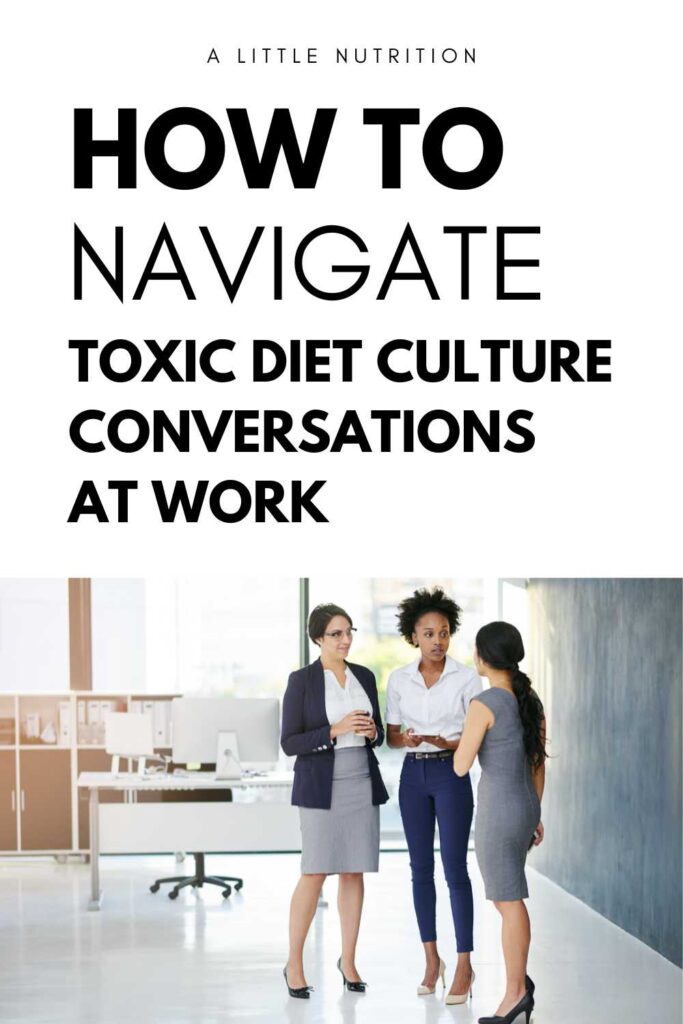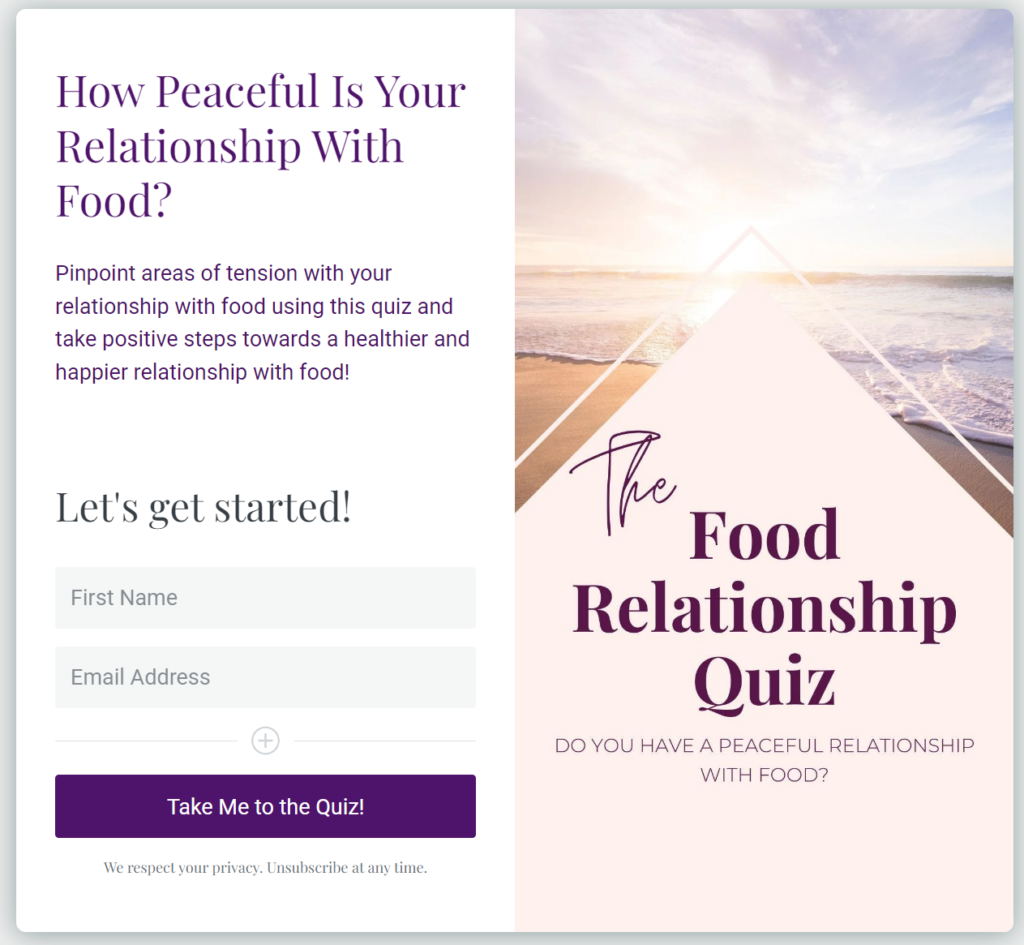If you work in an office, chances are you’ve experienced some toxic diet culture conversations. Whether it’s your boss bragging about their latest “cleanse” or your coworker making comments about their weight, these conversations can be tough to navigate. But there are some strategies you can use to make them easier. Here are some tips for dealing with toxic diet culture conversations at work.
What is diet culture, and why is it harmful?
Diet culture refers to a societal norm and belief system that promotes the destructive, unhealthy practices of dieting – whether through meal-skipping and fasting, compensatory exercise, moralizing food as either “good” or “bad,” or preoccupation with weight status. It is rooted in a capitalist billion-dollar industry where branding, marketing, and unrealistic “ideal” body images are perpetuated to sell products. Diet culture and their conversations can have severe mental and physical consequences on individuals, such as anxiety, depression, and an obsession with short-term weight loss goals that ignore long-term health.
Diet culture encourages unhealthy behaviors such as restrictive eating, depriving oneself of nutrient-dense food groups, and ignoring internal body signals like hunger and fullness. It can also lead to feelings of guilt or shame when certain foods are eaten due to their “unhealthy” label from society. Ultimately, diet culture profoundly affects our beliefs about health, diets, and ourselves, which is why navigating conversations about toxic diet culture in the workplace is so important.
How does diet culture show up in the workplace?
Diet culture shows up in the workplace in a multitude of ways. It can show up in seemingly innocent conversations about “good” and “bad” foods, as well as language implying certain body types, sizes, or shapes are more preferable to others. Additionally, company weight loss challenges, comments on food choices during meetings, and body comparison water cooler conversations – reinforce the workplace’s diet culture.

How can you navigate conversations about diet culture at work without getting pulled into them yourself?
Navigating conversations about diet culture in the workplace can be difficult, but it doesn’t have to be. Here are some tips to help avoid discussions focused around diets, body and judgmental comments about food and food choices.
Eat What You Want and Ignore Diet Culture Talk
First and foremost, it is essential to remember that what you decide to eat is nobody’s business but your own. Eating certain foods or avoiding certain foods does not make you better or worse than anyone else. And it does not need to be discussed with coworkers. If someone comments on what you are eating, simply remind them that it is none of their business and move on. Don’t engage in further conversation about the topic, as it will only encourage them.
Things you can try:
- You can be direct and ask the person you are speaking with not to discuss diets with you.
- You can change the subject and ask if you could talk about something else.
- You can show the person you are talking to that you care more about them than their latest diet by saying. “There are so many more important things I would like to discuss with you right now, like how are things going with that new project you are working on? [insert anything that you know about the person, like their pet, hobby, or project, to shift the focus of the conversation away from diet talk.]
Have Compassion
While it can be easy to let comments from colleagues get under your skin, try having compassion for their behaviors instead of getting angry, frustrated or taking comments personally. People who comment on others’ food choices often do so because they feel uncomfortable about their eating habits. Or they are desperately trying to fit into the “perfect body” narrative perpetuated by diet culture. You are less likely to internalize coworkers’ food or body comments when you have compassion and an understanding of where your coworkers are coming from. Their comments are more than likely about their own insecurities with their relationship with food, and has nothing to do with you.
Listen To What Your Body Needs
Most importantly, listen to your body’s needs and honor those needs without judgment or apology. Only you know what foods make you feel energized and healthy, so trust yourself when making food decisions. Remind yourself that food is fuel for your body and that there is no one-size-fits-all approach to nutrition. What feels good in the body for one person may not feel the same for another!
Know how to set boundaries
It’s important to remember that everyone has different beliefs, values, and ideas of what is healthy. It’s not your job to change them. If you start feeling uncomfortable or overwhelmed when faced with these conversations, tell the person politely that you’d prefer not to discuss it. When possible, redirect the conversation by bringing up work-related topics such as upcoming projects, deadlines, or meetings.
Walk away
When coworkers start talking about toxic diet culture conversations, sometimes it’s best just to walk away. Taking a break from the situation and changing your environment can help you reset and refocus on more productive conversations. Consider eating your lunch in your car or at a local park. Take some time for yourself away from the diet culture conversations.
Find an ally
Finding a workplace ally who is also trying to avoid toxic diet culture conversations can make navigating diet culture conversations much easier. Knowing that you have someone on your side who values the same things as you can be incredibly empowering. It also makes it easier to support one another in times of need and brings the focus back to healthier topics such as goal setting, self-care, and positive body image. Being able to talk about these things with someone who understands openly can help both of you stay on track with your personal journeys and prevent being involved in harmful conversations arising in the workplace.
Learning how to navigate toxic diet culture conversations at work can be a challenging but important process in your health journey. If a conversation around diet culture or health veers off into territory that makes you uncomfortable, don’t hesitate to pull back or end the conversation altogether. If you need additional support, please schedule an appointment with one of our dietitians.
Pin For Later







